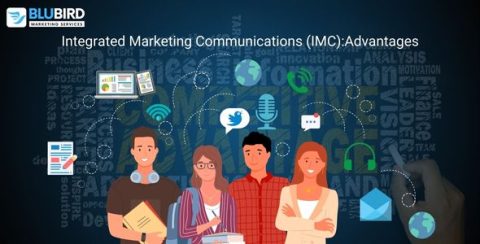The fundamental marketing concept applies to all business communication, not just advertising. integrated marketing communications (IMC) is both a theory and a set of business practices that provide consistent messaging across channels and produce a unique brand experience for customers. Integrated marketing focuses on creating a compatible and positive experience for customers every time they meet or interact with a brand.
The Progress of IMC:
With the data-tracking feature of computers, it became possible for digital marketing agency to understand purchasing behavior and track campaigns. The idea of integrated marketing communications has been around since the late 1980s when modern forms of communication were becoming more active.
And with more channels of communication came multiple ways to interrelate with customers. Where advertising was once a clear-cut and separate department, all forms of online marketing business communication began to have marketing relevance. This new information about customer tastes and habits meant that marketing changed from a one-way announcement to a two-way conversation.
It has become even more important in the age of social media and mobile phones when consumers interrelate with brands they care about daily. Since then, integrated marketing has been a field of conceptual research and a strategic approach to improving marketing operations with consistent and multichannel customer experiences that lead to huge brand identification, trust, and loyalty.
For that reason, integrated marketing is more than reliable branding. Marketing these days is about the customer, not the business, which means that not only do communications need to be coordinated and consistent — but they also need to be targeted and specialized.
Advantages of Integrated Marketing Communications
Companies that focus on multichannel customer engagement grow faster than those that don’t. In today’s marketing world, an integrated strategy can give you a big benefit. Whether you have a strategy or not, you are likely using multichannels — and if not, your competitors are.
Integrated marketing offers the following advantages:
Recallability:
The number of ads we see per day in 2022 is up to 10,000, so we’re more likely to remember the ones that make a consistent impression and appear on multiple platforms. When your messages remain the same across all platforms, they will be more effective.
Effectiveness
Internal assets and marketing communications can also be streamlined. With an integration plan, you can recycle content and have an efficient production and distribution plan. You can attach campaigns to larger business objectives more purposefully instead of relying on scattered and duplicated projects across departments with incompatible metrics.
Faithfulness
An important component of integrated marketing is understanding and responding to customers. People like to know what to expect. Customers who consistently get a great and reliable experience from a brand want to return.
It is hard to remember these other means of communication and all of the ways that customers may come into contact with a brand. Integrating marketing works in a bunch with public relations, corporate communications, media relations, and other common outlets for marketing messaging.
With a game plan in place, your company can show up on the field the way it needs to. They want to interact with brands in different ways and find content important to their unique needs and tastes. Customers learn in new ways and do their research. It can be a huge challenge for companies to maintain this customer data and respond to it wisely. After all, consumer trust has been shaped by the multiple channels they use daily.
Strategies for Integrated Marketing Communications
You should get an idea of the various applications it can be used for from this list of common approaches. Various ideas exist about what IMC means and how it can be executed.
Customer-focused
The form of a combined communication strategy for marketing is decided by the results. The marketing team performs research before creating any content or messaging. They determine the target market and determine the needs and values of their clients using internal data or outside resources. This approach starts by seeking to understand consumers.
Outsourced
They can look at what your company is trying to accomplish, how well it’s performing, and what it will take to integrate marketing communications. Then they can implement the strategy. Finding a third-party group to handle content generation, analytics, and research is one approach.
Inter-functional
To create an interactive and engaging customer service experience, a strategy that is becoming more and more common in the digital age is to start by establishing many touchpoints for customers, both online and in person.
How to use integrated marketing communications
There are several fundamental steps and factors you need to make to execute this approach and carry out a complete campaign. By merging your marketing communications, your campaigns will be more effective.
Know your audience
To understand their tastes and behavior, use internal data and study. Identify which channels they usually use. For example, the age demographics on LinkedIn, Instagram, and TikTok differ. Use only the channels that your clients use; you don’t have to employ every available channel. Make personas based on the problems that your customers experience so that you can better target your content.
Build a team
Define which agencies must be involved. Getting the sales and marketing teams in sync is important, but everyone involved in communications matters. That can be another team, public relations, or business communication.
Set goals
What is the campaign’s desired outcome for your company? Develop goals that are simple, measurable, achievable, relevant, and have a due date. Select the KPIs that will enable you to measure exposure and engagement efficiently.
Create a schedule and a process
The importance of having a clear strategy and structure for partnership increases with the number of individuals, be decision-makers or content creators.
Conclusion
Integrated marketing communications (IMC) is a theory and set of practices that focus on uniform messaging across channels to create a unique brand experience for customers. It has become gradually more important in the digital age, where customers interact with brands daily, and offers advantages such as increased recallability, effectiveness, and customer loyalty. Strategies for IMC include customer-focused research, externalizing, and inter-functional collaboration. To effectively use IMC, businesses should understand their audience, build a team, and set clear goals with measurable key performance indicators (KPIs).






